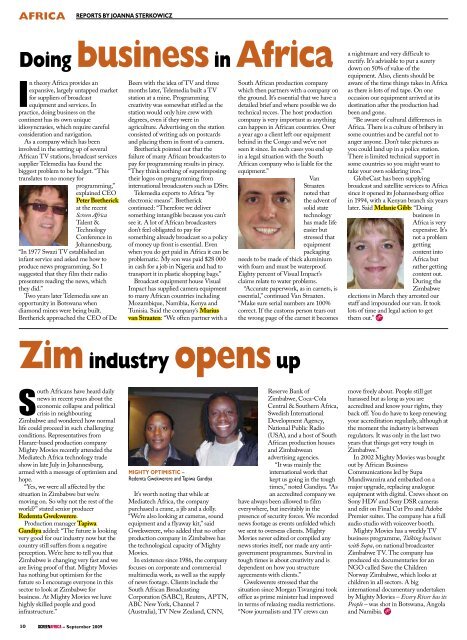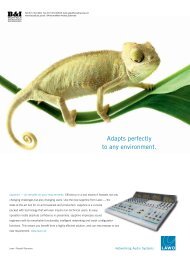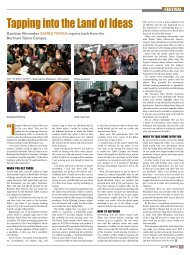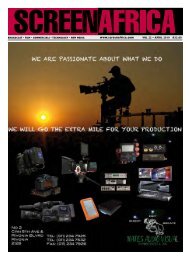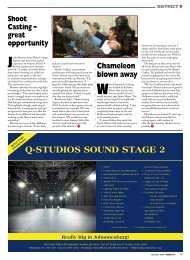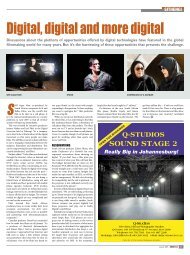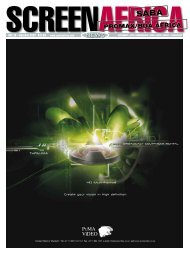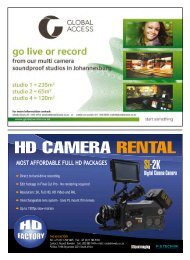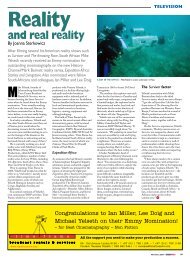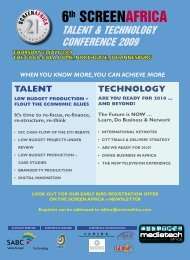Download Part 1 - size: 3.3mb - Screen Africa
Download Part 1 - size: 3.3mb - Screen Africa
Download Part 1 - size: 3.3mb - Screen Africa
Create successful ePaper yourself
Turn your PDF publications into a flip-book with our unique Google optimized e-Paper software.
AFRICA<br />
Reports by Joanna Sterkowicz<br />
Doing business in <strong>Africa</strong><br />
In theory <strong>Africa</strong> provides an<br />
expansive, largely untapped market<br />
for suppliers of broadcast<br />
equipment and services. In<br />
practice, doing business on the<br />
continent has its own unique<br />
idiosyncrasies, which require careful<br />
consideration and navigation.<br />
As a company which has been<br />
involved in the setting up of several<br />
<strong>Africa</strong>n TV stations, broadcast services<br />
supplier Telemedia has found the<br />
biggest problem to be budget. “This<br />
translates to no money for<br />
programming,”<br />
explained CEO<br />
Peter Bretherick<br />
at the recent<br />
<strong>Screen</strong> <strong>Africa</strong><br />
Talent &<br />
Technology<br />
Conference in<br />
Johannesburg.<br />
“In 1977 Swazi TV established an<br />
infant service and asked me how to<br />
produce news programming. So I<br />
suggested that they film their radio<br />
presenters reading the news, which<br />
they did.”<br />
Two years later Telemedia saw an<br />
opportunity in Botswana when<br />
diamond mines were being built.<br />
Bretherick approached the CEO of De<br />
Beers with the idea of TV and three<br />
months later, Telemedia built a TV<br />
station at a mine. Programming<br />
creativity was somewhat stifled as the<br />
station would only hire crew with<br />
degrees, even if they were in<br />
agriculture. Advertising on the station<br />
consisted of writing ads on postcards<br />
and placing them in front of a camera.<br />
Bretherick pointed out that the<br />
failure of many <strong>Africa</strong>n broadcasters to<br />
pay for programming results in piracy.<br />
“They think nothing of superimposing<br />
their logos on programming from<br />
international broadcasters such as DStv.<br />
Telemedia exports to <strong>Africa</strong> “by<br />
electronic means”. Bretherick<br />
continued: “Therefore we deliver<br />
something intangible because you can’t<br />
see it. A lot of <strong>Africa</strong>n broadcasters<br />
don’t feel obligated to pay for<br />
something already broadcast so a policy<br />
of money up front is essential. Even<br />
when you do get paid in <strong>Africa</strong> it can be<br />
problematic. My son was paid $28 000<br />
in cash for a job in Nigeria and had to<br />
transport it in plastic shopping bags.”<br />
Broadcast equipment house Visual<br />
Impact has supplied camera equipment<br />
to many <strong>Africa</strong>n countries including<br />
Mozambique, Namibia, Kenya and<br />
Tunisia. Said the company’s Marius<br />
van Straaten: “We often partner with a<br />
South <strong>Africa</strong>n production company<br />
which then partners with a company on<br />
the ground. It’s essential that we have a<br />
detailed brief and where possible we do<br />
technical recces. The host production<br />
company is very important as anything<br />
can happen in <strong>Africa</strong>n countries. Over<br />
a year ago a client left our equipment<br />
behind in the Congo and we’ve not<br />
seen it since. In such cases you end up<br />
in a legal situation with the South<br />
<strong>Africa</strong>n company who is liable for the<br />
equipment.”<br />
Van<br />
Straaten<br />
noted that<br />
the advent of<br />
solid state<br />
technology<br />
has made life<br />
easier but<br />
stressed that<br />
equipment<br />
packaging<br />
needs to be made of thick aluminium<br />
with foam and must be waterproof.<br />
Eighty percent of Visual Impact’s<br />
claims relate to water problems.<br />
“Accurate paperwork, as in carnets, is<br />
essential,” continued Van Straaten.<br />
“Make sure serial numbers are 100%<br />
correct. If the customs person tears out<br />
the wrong page of the carnet it becomes<br />
a nightmare and very difficult to<br />
rectify. It’s advisable to put a surety<br />
down on 50% of value of the<br />
equipment. Also, clients should be<br />
aware of the time things takes in <strong>Africa</strong><br />
as there is lots of red tape. On one<br />
occasion our equipment arrived at its<br />
destination after the production had<br />
been and gone.<br />
“Be aware of cultural differences in<br />
<strong>Africa</strong>. There is a culture of bribery in<br />
some countries and be careful not to<br />
anger anyone. Don’t take pictures as<br />
you could land up in a police station.<br />
There is limited technical support in<br />
some countries so you might want to<br />
take your own soldering iron.”<br />
GlobeCast has been supplying<br />
broadcast and satellite services to <strong>Africa</strong><br />
since it opened its Johannesburg office<br />
in 1994, with a Kenyan branch six years<br />
later. Said Melanie Gibb: “Doing<br />
business in<br />
<strong>Africa</strong> is very<br />
expensive. It’s<br />
not a problem<br />
getting<br />
content into<br />
<strong>Africa</strong> but<br />
rather getting<br />
content out.<br />
During the<br />
Zimbabwe<br />
elections in March they arrested our<br />
staff and impounded our van. It took<br />
lots of time and legal action to get<br />
them out.”<br />
Zim industry opens up<br />
South <strong>Africa</strong>ns have heard daily<br />
news in recent years about the<br />
economic collapse and political<br />
crisis in neighbouring<br />
Zimbabwe and wondered how normal<br />
life could proceed in such challenging<br />
conditions. Representatives from<br />
Harare-based production company<br />
Mighty Movies recently attended the<br />
Mediatech <strong>Africa</strong> technology trade<br />
show in late July in Johannesburg,<br />
armed with a message of optimism and<br />
hope.<br />
“Yes, we were all affected by the<br />
situation in Zimbabwe but we’re<br />
moving on. So why not the rest of the<br />
world?” stated senior producer<br />
Redemta Gwekwerere.<br />
Production manager Tapiwa<br />
Gandiya added: “The future is looking<br />
very good for our industry now but the<br />
country still suffers from a negative<br />
perception. We’re here to tell you that<br />
Zimbabwe is changing very fast and we<br />
are living proof of that. Mighty Movies<br />
has nothing but optimism for the<br />
future so I encourage everyone in this<br />
sector to look at Zimbabwe for<br />
business. At Mighty Movies we have<br />
highly skilled people and good<br />
infrastructure.”<br />
MIGHTY OPTIMISTIC –<br />
Redemta Gwekwerere and Tapiwa Gandiya<br />
It’s worth noting that while at<br />
Mediatech <strong>Africa</strong>, the company<br />
purchased a crane, a jib and a dolly.<br />
“We’re also looking at cameras, sound<br />
equipment and a flyaway kit,” said<br />
Gwekwerere, who added that no other<br />
production company in Zimbabwe has<br />
the technological capacity of Mighty<br />
Movies.<br />
In existence since 1986, the company<br />
focuses on corporate and commercial<br />
multimedia work, as well as the supply<br />
of news footage. Clients include the<br />
South <strong>Africa</strong>n Broadcasting<br />
Corporation (SABC), Reuters, APTN,<br />
ABC New York, Channel 7<br />
(Australia), TV New Zealand, CNN,<br />
Reserve Bank of<br />
Zimbabwe, Coca-Cola<br />
Central & Southern <strong>Africa</strong>,<br />
Swedish International<br />
Development Agency,<br />
National Public Radio<br />
(USA), and a host of South<br />
<strong>Africa</strong>n production houses<br />
and Zimbabwean<br />
advertising agencies.<br />
“It was mainly the<br />
international work that<br />
kept us going in the tough<br />
times,” noted Gandiya. “As<br />
an accredited company we<br />
have always been allowed to film<br />
everywhere, but inevitably in the<br />
presence of security forces. We recorded<br />
news footage as events unfolded which<br />
we sent to overseas clients. Mighty<br />
Movies never edited or compiled any<br />
news stories itself, nor made any antigovernment<br />
programmes. Survival in<br />
tough times is about creativity and is<br />
dependent on how you structure<br />
agreements with clients.”<br />
Gwekwerere stressed that the<br />
situation since Morgan Tsvangirai took<br />
office as prime minister had improved<br />
in terms of relaxing media restrictions.<br />
“Now journalists and TV crews can<br />
move freely about. People still get<br />
harassed but as long as you are<br />
accredited and know your rights, they<br />
back off. You do have to keep renewing<br />
your accreditation regularly, although at<br />
the moment the industry is between<br />
regulators. It was only in the last two<br />
years that things got very tough in<br />
Zimbabwe.”<br />
In 2002 Mighty Movies was bought<br />
out by <strong>Africa</strong>n Business<br />
Communications led by Supa<br />
Mandiwanzira and embarked on a<br />
major upgrade, replacing analogue<br />
equipment with digital. Crews shoot on<br />
Sony HDV and Sony DSR cameras<br />
and edit on Final Cut Pro and Adobe<br />
Premier suites. The company has a full<br />
audio studio with voiceover booth.<br />
Mighty Movies has a weekly TV<br />
business programme, Talking business<br />
with Supa, on national broadcaster<br />
Zimbabwe TV. The company has<br />
produced six documentaries for an<br />
NGO called Save the Children<br />
Norway Zimbabwe, which looks at<br />
children in all sectors. A big<br />
international documentary undertaken<br />
by Mighty Movies – Every River has its<br />
People – was shot in Botswana, Angola<br />
and Namibia.<br />
10<br />
SCREENAFRICA – September 2009


